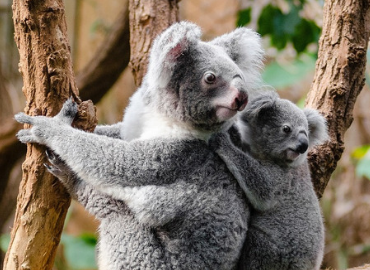Why study in Australia?
Studying in Australia provides a wide range of benefits for international students. Here are some reasons why studying in Australia is a good choice:
Educational Quality: Australia has a high-quality education system, with internationally renowned universities and schools. Its academic institutions are consistently ranked internationally, ensuring a high level of education.
Variety of Courses and Specializations: Australia offers a wide variety of programs in different fields and areas of knowledge. From technical and vocational courses to undergraduate and postgraduate programs, there are options for all interests and careers.
Excellent Study Environment: Schools and universities in Australia provide a modern and welcoming study environment. They have state-of-the-art facilities, well-equipped laboratories, and innovative learning resources.
Focus on Research: Australia is also recognized for its focus on research and innovation. Students have the opportunity to work with experts in various fields and participate in cutting-edge research projects.
Cultural Diversity: Studying in Australia offers the opportunity to interact with people from different cultures and nationalities. It is a multicultural environment that will enrich you both educationally and personally.
Job Opportunities: Australia maintains a strong and prosperous economy. Studying in this country provides the opportunity to access a global market, even with employment possibilities after graduation.
Lifestyle and Nature: Australia is known for its stunning natural beauty and as a peaceful place to live. You have beautiful beaches to enjoy, vibrant cities, national parks, and a wide variety of outdoor activities.
Safety and Wellbeing: It is considered one of the safest countries globally. The Australian government provides support and protection to international students, ensuring their well-being during their stay.
Scholarship Programs: Australia offers various scholarship programs for international students, making studying there more accessible and affordable.
Multicultural Experience: Studying in Australia allows you to immerse yourself in a unique multicultural experience. You can meet people from around the world, share different perspectives, and expand your cultural horizons.
In general, Australia offers an exceptional combination of education in a safe and welcoming environment full of job opportunities and an enriching experience that allows for academic and personal growth.
What can you study in Australia?
These are some of the opportunities you have when studying in Australia:
-
Language Programs: Language courses to improve your language skills before starting an academic or professional career.
-
Vocational and Technical Education: Technical and vocational courses in areas such as tourism, arts, hospitality, design, technology, healthcare, among others.
-
Bachelor's Degrees: Undergraduate degrees in a wide variety of disciplines, such as business, science, engineering, arts, social sciences, etc.
-
Postgraduate Programs: Master's and PhD programs in different areas of study, including research and professional postgraduate programs. You also have the option of taking a postgraduate diploma and specialization programs in various areas to enhance your skills and knowledge.
-
MBA: Master of Business Administration (MBA) programs for those interested in management and business leadership.
-
Health Education: Courses in medicine, nursing, dentistry, pharmacy, and recreational and artistic areas such as design, film, music, theater, and other disciplines.
-
Environmental Sciences: Studies related to environmental conservation and sustainability.
-
Technology and Information Sciences Education: Courses in computer science, software engineering, data science, etc.
It's important to research different educational institutions in Australia to find the one that best suits your interests and academic goals. It is recommended to consult their websites and admission materials for detailed information on available courses and admission requirements for international students.
What do you need to study in Australia?
To study in Australia as an international student, you need to meet certain requirements and follow an application process. Here is a list of the most important aspects to consider:
-
Obtain an Offer of Admission: The first thing you need to do is be accepted into an Australian educational institution that offers the study program you want to pursue. You can apply for a student visa once you have been accepted into an institution. You will also need to apply for a student visa (Subclass 500). To do this, you will need a Confirmation of Enrolment (CoE) from the institution and demonstrate that you have enough funds to cover tuition costs and support yourself in Australia.
-
Health Insurance: International students must have health insurance that meets the requirements set by the Australian government.
-
Meet Language Requirements: You may need to demonstrate your English proficiency through a recognized exam, such as IELTS or TOEFL, depending on the program and level of study.
-
Sufficient Financial Resources: You must have enough financial resources to cover tuition, accommodation, food, and other expenses during your stay in Australia. You may also need to provide evidence of financial solvency to obtain the student visa. Additionally, a medical examination and compliance with all requirements imposed by the country may be necessary to obtain the student visa.
-
Comply with Study Conditions: During your stay in Australia, you must comply with the conditions of your student visa, including attending classes regularly and maintaining satisfactory academic progress.
It is important to check the official website of the Department of Home Affairs of Australia for up-to-date and detailed information on the requirements and the application process for studying in Australia as an international student.
Why work in Australia?
Working in Australia offers numerous advantages and opportunities for foreign workers. Some of the reasons why it's good to work in Australia include:
Economic Stability: Australia has a stable and prosperous economy, providing job opportunities in various fields and industries. It also offers competitive salaries, generally higher compared to many other countries, allowing workers to earn a decent income to sustain themselves and save.
Fair Working Conditions: Australia has a robust labor protection system that ensures fair working conditions, such as regulated working hours, paid vacation days, and workplace safety. Working in Australia provides the opportunity to gain international work experience, which can be valuable for your career and professional development.
Diverse Work Environment: Australia is a multicultural country with a wide diversity of people and cultures. Working in a culturally diverse country can enrich your experience and perspective.
Career Opportunities: Australia has a growing demand for skilled workers in various sectors, creating opportunities for career growth and advancement.
High Quality of Life: Australia is known for its high quality of life, with a world-class healthcare system, quality education, and a safe and clean environment.
Political and Social Stability: Australia is one of the most comfortable and secure countries to live in globally. Even social workers can access state benefits, such as the social security system that provides support in times of need.
Possibility of Immigration: Working in Australia can open the possibility of applying for permanent residency in the country, allowing you to establish and live there in the long term.
It's important to research and understand visa requirements and labor regulations before seeking employment in Australia. It's also advisable to consult official government websites and employment agencies for updated and accurate information on job opportunities and immigration procedures.
How are salaries in Australia?
Salaries in Australia vary based on industry, experience level, geographic location, and type of employment. This country has a minimum wage system established by law, known as the "National Minimum Wage." As of mid-2022, the minimum wage for full-time employees over 21 years old was around 20.33 Australian dollars per hour.
However, many workers in Australia receive wages above the minimum wage due to the demand for skilled labor in various industries. Some industries that generally offer higher salaries include engineering, information technology, mining, healthcare, banking, and finance, among others.
It's essential to consider that salaries can significantly vary depending on the geographic location. Larger and developed cities like Sydney and Melbourne tend to have higher salaries compared to suburbs or rural areas.
In addition to the base salary, many workers in Australia also receive additional benefits such as bonuses, health insurance, and contributions to pension plans.
For accurate and updated information on salaries in a specific area or industry in Australia, it is recommended to consult government websites, labor unions, and online employment resources.
Minimum wage in Australia
As stated by the Fair Work Commission, the Industrial Relations Tribunal under the Australian Government, the national minimum wage from July 1, 2023, is AUD 23.23 (USD 15.35) per hour or AUD 812.60 (USD 536.88) per week (working 38 hours per week).
Advantages of living in Australia
Living in Australia provides various opportunities and benefits, some of which include:
Quality of Life: Australia is known for its high quality of life. It offers a safe, clean, and healthy environment with excellent healthcare and education services. Additionally, being a multicultural country with a wide variety of cultures and ethnicities creates a welcoming and enriching atmosphere for foreigners living in the country.
Job Opportunities: Australia has a prosperous economy and offers many job opportunities in diverse industries, attracting skilled workers from around the world. It also provides quality education with internationally renowned universities and schools, making it a popular destination for international students seeking quality education.
Stunning Natural Environment: Australia is famous for its natural beauty, including beaches, forests, mountains, and a diverse range of landscapes. It is a paradise for nature lovers and outdoor enthusiasts, with varied climates, generally enjoying temperate and pleasant weather in many regions, allowing for outdoor activities throughout much of the year.
High-Quality Healthcare System: Australia boasts a world-class public healthcare system that provides accessible and high-quality medical care for all residents, including foreigners with long-term visas.
Safety and Stability: Australia is a safe and politically stable country, providing peace of mind and security to all its inhabitants.
Relaxed Lifestyle: Australians typically lead a relaxed and balanced lifestyle, allowing for a good balance between work and leisure time.
Emigration Opportunities: Living in Australia can open doors to applying for permanent residency, allowing foreigners to establish themselves in the country in the long term.
It's essential to note that each person has different experiences and perspectives, so what may be an advantage for someone may not be as much for another person.
How to immigrate to Australia?
Emigrating to Australia involves following a detailed process and meeting certain requirements set by the Australian government. In the following text, we provide information on what you need to know before starting your journey to Australia:
Evaluate Your Eligibility: The first step is to check if you are eligible to immigrate to Australia. You can review different visa options and eligibility criteria on the official website of the Department of Home Affairs. You should select the type of visa that best suits your situation and goals. There are different types of visas for various purposes, such as work visas, study visas, family reunification, investment visas, among others.
Gather Required Documentation: Once you have selected the type of visa, gather all the necessary documentation to submit your application. Documents may vary depending on the type of visa, but generally include a valid passport, education certificates, evidence of work experience, and language certificates. Submit your visa application and complete the required documents to the Department of Home Affairs.
Wait for a Response: The processing time for visa applications varies depending on the type of visa and other factors. It's important to be patient and wait for an official response from the immigration department.
Meet Visa Requirements: If your application is approved, make sure to meet all the visa requirements once you arrive in Australia, such as maintaining employment (if it's a work visa), attending classes (if it's a study visa), among others.
Explore Job Opportunities: If you are looking to immigrate to Australia for work, research job opportunities in your field in the country and look for employers who can sponsor you for a work visa.
Remember that the process of immigrating to Australia can be complex and varies depending on individual circumstances. It is recommended to seek professional advice or consult the official website of the Australian government for detailed and updated information on the immigration process and specific visa requirements.
What to visit in Australia?
Australia offers a wide variety of stunning destinations to visit, from vibrant cities to breathtaking natural landscapes. Here are some highlights to encourage you to explore:
Sydney: Visit the iconic Sydney Opera House, the Sydney Harbour Bridge, and enjoy the famous beaches of Bondi and Manly. Don't miss the experience of going up to the Sydney Tower Eye lookout for panoramic views of the city.
Melbourne: Explore the modern city of Melbourne, known for its artistic and cultural prominence. Enjoy the cafes and restaurants, visit the street art of Hosier Lane, and stroll through the beautiful Royal Botanic Gardens of Melbourne.
Great Barrier Reef: Considered one of the natural wonders of the world, the Great Barrier Reef offers opportunities for diving and snorkeling, revealing an astonishing variety of marine life and colorful corals.
Great Ocean Road: Travel along this spectacular coastal road in the state of Victoria, taking you through stunning cliffs, rock formations like the Twelve Apostles, and beautiful beaches.
Kakadu National Park: Explore the natural beauty and rich wildlife of Kakadu National Park, located in the Northern Territory. Here, you'll find ancient Aboriginal rock paintings, waterfalls, and spectacular landscapes.
Whitsunday Islands: Enjoy white sandy beaches and crystal-clear waters in the Whitsunday Islands, a tropical paradise in Queensland. The famous Whitehaven Beach is a must-visit.
Tasmania: Discover the wild beauty and pristine nature of Tasmania. Explore Cradle Mountain-Lake St Clair National Park, Wineglass Bay, and the historic city of Hobart.
Brisbane: Visit the capital of Queensland and enjoy its subtropical climate. Explore the South Bank Parklands, the Queensland Museum and Art Gallery, and take in panoramic views from the Mt Coot-tha lookout.
Blue Mountains National Park: Located near Sydney, this national park offers stunning mountain landscapes, gorges, and waterfalls.
These are just a few of the many impressive places to visit in Australia. Each region of the country has its unique beauty and offers a wide range of activities and experiences to enjoy.
Cultural Scene
The culture in Australia is diverse and multicultural, reflecting a blend of indigenous, British, and other global influences. Here are some highlights:
Multiculturalism: Australia is a multicultural country with a great diversity of cultures and ethnicities. Immigration has enriched Australian society, and communities from different countries and cultures can be found throughout the country. Australians tend to have a relaxed and casual lifestyle, and outdoor living is popular due to the pleasant climate and numerous beaches and natural spaces.
Sports Enthusiasts: Australians are usually sports enthusiasts, with sports playing a central role in Australian culture. Cricket, Australian Rules Football, rugby, and surfing are some of the most popular and followed sports.
Celebrations and Festivals: Australia celebrates various festivities, including Australia Day on January 26, commemorating the arrival of the first British settlers. Multicultural festivals reflecting the diversity of the population are also celebrated.
Gastronomy: Australian cuisine is a fusion of different culinary traditions. In addition to typical Australian dishes, you can find restaurants offering food from around the world due to multicultural influences.
Arts and Culture: Australia has a thriving artistic and cultural scene, with film festivals, theater productions, music events, and art exhibitions in different cities. The country also has a rich tradition of Aboriginal art, which is an important part of its cultural identity.
Nature Respect: Many Australians have a deep connection with nature. Environmental conservation and outdoor life are essential values in Australian culture.
Inclusive Mentality: Australia strives to promote equality and inclusion. Australians are generally open, friendly, and respectful of different cultures and lifestyles, making it easier for you to fully engage and be yourself within a welcoming community.
Australian Aboriginals: Australian Aboriginals, the country's indigenous inhabitants, have a rich and diverse culture that plays a significant role in the Australian identity.
In summary, Australian culture is vibrant, diverse, and inclusive. Australians value their multicultural heritage and have a relaxed approach to life while maintaining a strong sense of national identity and pride in their indigenous heritage.
Useful information about Australia
SALARY AND TAXES
Hourly wage: AUD $20.33
Taxes: 19%-45% (progressive tax system)
*At XPA, we support you with your tax refund if you meet the requirements to apply for it once you have completed your trip and/or the calendar year for taxes.
![]()
Accommodation (Cost per person in a shared house/apartment):
Cities: AUD $600 - AUD $1,200
Towns: AUD $400 - AUD $1,000
Utilities (electricity, heating, water, garbage): AUD $150 - AUD $300
Groceries: AUD $320 - AUD $600
Public transport: AUD $100 - AUD $200
Other expenses (dining out, entertainment, personal care): AUD $100 - AUD $200
Total: Approximately AUD $970 - AUD $2,500

VISAS AVAILABLE WITH OUR PROGRAMS
Working Holiday: Yes
Nomad: Yes
Student Visa: Yes, with work permit
Job Search Visa: No
Why experience Australia?










Other programs in Australia

Working Holiday Australia
Participants of the Working Holiday Australia program have the opportunity to work paidly in Australia for a maximum of 12 months, during which you can also have the option to get another job or to move to another place or city within the country.

Language Courses
At XPA, we collaborate with the best schools and universities worldwide for language learning, and we provide highly competitive prices for the course you are looking for. Get a quote with us!

Student Exchange
This program is a cultural and academic exchange for high school students allowing you to have a cultural immersion experience, improving language skills, and also connect you with friends from all over the world for a few weeks, a quarter, a semester, or an academic year.





